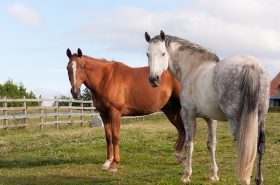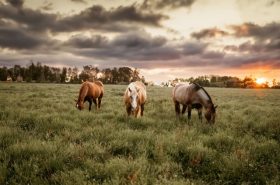Our horses love apples and carrots, of course, but sometimes we like to offer them the tasty store-bought treats as well. These are often coated with molasses or other taste bud tempters. Mmmm…
But as much as our horses love these special snacks, we know that equine digestion is a delicate operation at best. So, caution is key. Let’s look at a few rules for keeping treats safe and healthy this Valentine’s Day (and throughout the year!).
10 Treats for Horses
1. Always consider your horse’s special diet needs first. If your horse is insulin resistant, have difficulty chewing, or suffers from gastric upset, his treats should be geared towards his special needs. Check with your equine nutritionist or veterinarian if you’re unsure.
2. Read ingredient lists carefully. If sugar is the main ingredient, this probably isn’t the best treat for your horse. Choose treats that include natural ingredients like carrots, apples, and even pumpkin.
3. Consider the size and texture of the treat. Don’t feed treats that are very hard to crunch or large enough to become lodged in the equine throat.
4. When feeding treats, insist on polite behavior. Some horses can get pushy or aggressive when they hear a familiar treat bag rustle. For these horses, place their treats in their feed bins instead or teach them to back away from you while you dole them out.
5. Store treats in an airtight container and out of direct sunlight. Organic treats often have a short shelf life so be sure to check expiration dates.
6. Don’t over feed treats. Even though your horse might not think so, he really can have too much of a good thing. Consider treats to be just that, a treat! They shouldn’t become a habit or occupy more than 5% of your horse’s total diet.
7. Don’t feed treats outside of the natural equine diet. Certain foods, like potatoes, chocolate, and tomatoes should never be offered. Grass clippings are another no-no. Lawn clippings often contain entophytes, a bacterium or fungus that lives within certain plants and is most dangerous to broodmares. As cut grass tends to mold quickly, it can present a colic risk as well.
8. If you want to feed treats, but you’re short on cash, don’t despair. Horses love all sorts of treats, most of which you probably already have in your kitchen. Create a horse ‘salad’ with chopped carrots, apples, and black oil sunflower seeds, sprinkled with a little brown sugar. Your horse will love you!
9. Your human pantry probably contains some horse-safe treats as well. Feel free to feed Fig Newtons®, ginger snaps, homemade carrot cake, and cornbread. Feed horses in moderation, of course as most of the above contain sugar.
10. Think about asking your horse to do something for his treat. Perhaps you can teach him to put his hoof on a stump or walk over a tarp. Horses are “treat hounds” There’s no end to the fun you can have.



